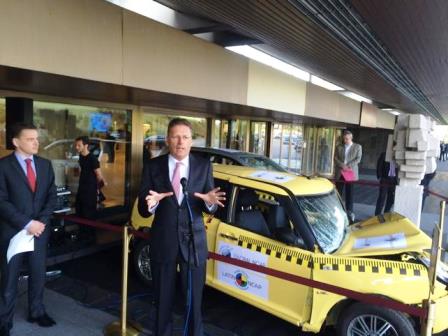
Tens of thousands of deaths and hundreds of thousands of injuries could be avoided each year in the world if all countries would apply the safety standards outlined in the UN regulations developed by the World Forum for the Harmonization of Vehicle Regulations. This was the conclusion of the study recently released by the Global New Car Assessment Programme (Global NCAP) which showed that millions of new cars sold in middle and low income countries fail to meet the UN’s regulations for front and side crash tests.
In order to further raise awareness on this situation, UNECE and Global NCAP are displaying two crashed cars at the Palais des Nations, in Geneva this week, on the occasion of the 66th session of the Economic Commission for Europe.
After a frontal impact test at 64 km/h, one car scores zero stars, with a very serious risk of fatal injury while the other achieves five stars, which provides a high level of occupant protection. The two cars illustrate the importance that crash tests play in ensuring road safety and the different levels of safety between cars sold in emerging markets and in advanced economies.
“We cannot accept that cars sold in middle and low income countries be deliberately less safe than those sold in developed countries,” said UNECE Executive Secretary Christian Friis Bach. “I therefore call on the motor industry as a whole to ensure that well-established safety standards be applied to all vehicles sold worldwide. I also urge all UN member States to ratify and fully apply the UN legal instruments on road safety, in particular the UN technical regulations for the construction of vehicles.”
David Ward, Global NCAP Secretary General, said: “by the end of the UN Decade of Action for Road Safety (2011-2020) at the latest we want all new cars to meet basic standards for both crash protection and crash avoidance. They must have crumple zones, air bags, and electronic stability control. Our latest report sets out ten clear recommendations to meet this deadline, and we are convinced that this timetable is both realistic and affordable.”
Every year, 1.24 million people die on the world’s roads and some 50 million people are injured. 80% of the deaths take place in middle-income countries and 12% in low-income countries, even though together they count for approximately only half of the world’s vehicles.
For more than 50 years, the World Forum has negotiated and adopted UN vehicle regulations aimed at reinforcing car safety. These cover, among others:
· the safety performance of vehicle for front and side impacts (UN Regulations Nos. 94 and 95);
· pedestrian safety (UN Regulation No. 127);
· the safety of electric vehicles and their high-voltage batteries (UN Regulation No. 100).
The UN regulations developed by the World Forum for the Harmonization of Vehicle Regulations are available at: http://www.unece.org/trans/main/welcwp29.html
The Global NCAP report Democratising Car Safety: Road Map for Safer Cars 2020 is available in eReader and PDF formats.
Note to editors
About the World Forum for the Harmonization of Vehicle Regulations
The World Forum for Harmonization of Vehicle Regulations (WP.29) is a Working Party within the United Nations Economic Commission for Europe's Inland Transport Committee. It manages three Global Agreements on vehicles. Any country that is member of the United Nations may participate in the activities of the World Forum and accede to the Agreements.
The 1958 Agreement aims at promoting the harmonization of Regulations and mutual recognition of approvals among Contracting Parties. It establishes UN Regulations for all categories of road vehicles and non-road mobile machinery equipment and parts. These address requirements and prescriptions for: safety; the environment (air and noise pollution emission) ; energy; theft prevention.
133 UN Regulations are annexed to the 1958 Agreement.
16 UN Global Technical Regulations (1998 Agreement)
There are 57 Contracting Parties to the 1958 Agreement and the 1998 Agreement.
| Region | Contracting Parties |
|---|---|
| Africa | Egypt, South Africa, Tunisia |
| America | Canada, United States of America |
| Asia | Azerbaijan, P. R. China, India, Japan, Kazakhstan, Malaysia, Republic of Korea, Tajikistan, Thailand |
| Europe | The 28 Member States of the European Union (EU), the EU, Switzerland, Norway, Belarus, Russian Federation, Ukraine, Albania, Bosnia and Herzegovina, Montenegro, Serbia, The former Yugoslav Republic of Macedonia, Turkey, Republic of Moldova |
| Oceania | Austrialia, New Zealand |
About Global NCAP
Global NCAP is an independent charity registered in the United Kingdom. It serves as a global platform for NCAPs around the world to exchange best practice in consumer orientated motor vehicle safety initiatives. Global NCAP also provides financial, technical and campaigns assistance to new programmes in the rapidly motorizing countries and regions of Asia and Latin America.
Global NCAP receives financial support from Bloomberg Philanthropies, the FIA Foundation, from International Consumer Testing and Research and from the Road Safety Fund.
Global NCAP supports the UN Decade of Action for Road Safety and is a member of the United Nations Road Safety Collaboration. There are currently nine NCAP programmes or similar active across the world.

